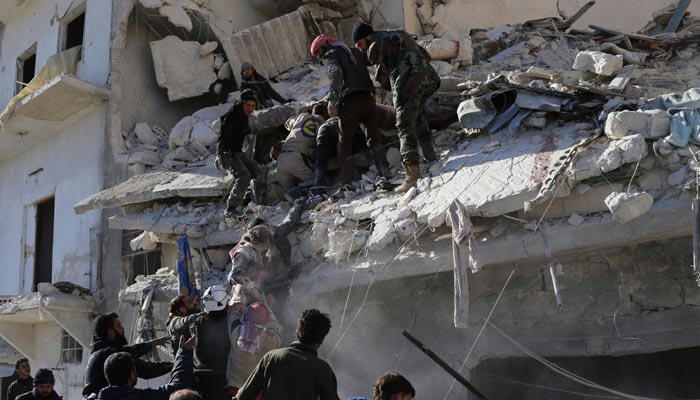Civilians and rescue workers remove a girl and search for other victims following a reported air strike by Syrian government forces in Aleppo. Syria's nearly five-year war has left more than 250,000 dead and forced some 12mn people from their homes.
AFP/Riyadh
Syria's splintered opposition gathers in Saudi Arabia on Tuesday for a difficult bid to unify ahead of potential peace talks with President Bashar al-Assad.
The Saudi-organised talks mark the first time representatives of Syria's various political and armed opposition factions gather together since the outbreak of the country's conflict in mid-2011.
The goal is to form a unified bloc for talks with Assad that world powers hope can be held before January 1.
But divisions have already emerged over the reported participation of some groups, including Ahrar al-Sham, allied with Al-Qaeda's Syrian affiliate Al-Nusra Front.
However, armed groups described as "terrorist" organisations, such as Al-Nusra Front itself and the Islamic State group, were not invited.
The powerful Saudi-backed Jaish al-Islam (Army of Islam) rebel force, which includes hardline Islamists, announced late on Monday it would be sending two delegates to take part.
Saudi Arabia insists invitations were extended to "all factions of the moderate Syrian opposition" including from all parties, sects and ethnic groups.
But Kurdish groups, including the US-backed Syrian Democratic Forces - a recently formed coalition of Kurdish, Arab Sunni Muslim, and Christian forces fighting IS - were not invited.
Kurdish groups including the leading Democratic Union Party (PYD) have organised their own two-day conference starting on Tuesday.
Previous attempts by international and regional powers have failed to unite the diverse Syrian opposition groups, whose differences have for years reflected the struggle for influence among the countries supporting them.
But there has been a growing diplomatic push for a resolution to Syria's devastating conflict, which has seen more than 250,000 people killed and millions forced from their homes.
Last month, top diplomats from 17 countries - including key international backers and opponents of Assad - agreed in Vienna on a fixed calendar for Syria that would see a transition government set up in six months and elections within 18 months.
'Difficult and risky'
Some 100 delegates are expected in Riyadh for this week's talks on forming an opposition bloc to negotiate with Assad on the transition.
About 20 members of the Istanbul-based National Coalition, the main Syrian opposition grouping, are taking part in the meetings, which take place as leaders of the Gulf Cooperation Council converge on Riyadh for their annual summit on Wednesday.
The deputy head of the National Coalition, which is recognised by much of the international community, Hisham Marwa, told AFP that unofficial preliminary talks would be held later on Tuesday.
Charles Lister, visiting fellow at the Brookings Doha Centre, told AFP that the talks aim "to go some way towards establishing an opposition negotiating team."
The Riyadh meeting is also "an attempt to establish a unified political structure between the recognised political opposition coalition and the armed opposition as a whole," the analyst said.
Syria's political opposition, including the exiled National Coalition, has long been accused of being out of touch with forces on the ground.
National Coalition member Samir Nashar said the talks would be "difficult and risky" as they could leave the opposition more divided than ever.
He said the aim was to "agree on a common and clear position concerning the future of Syria, the transition and the stance on (the fate of) Bashar al-Assad."
Speaking of "core differences" over Assad's fate, Nashar said he feared that "some groups close to states supporting the regime could demand that Assad stays during the transition period".
"This risks causing the failure of the meeting," he said.
Groups supported by the US, Saudi Arabia and Qatar are demanding Assad's rapid departure, a condition that Iran and Russia oppose.
The Syria-based opposition tolerated by the regime argues that Assad's fate should be decided by the Syrian people.
Despite the sidelining of many rebel groups, Marwa said there was some hope of moving forward at the talks.
"I am optimistic about the presence of military and political figures. This is the real opposition... Those absent are a small number who will not affect the equation," he said.
Saudi Arabia's regional rival Iran will meanwhile be watching the talks, after warning that the Saudi meeting would breach declarations made by both sides in Vienna seeking a list of mutually approved opposition groups.

